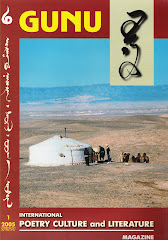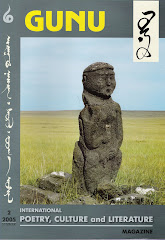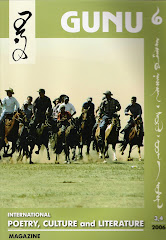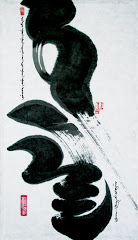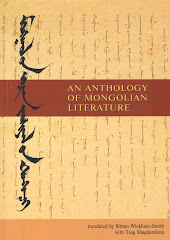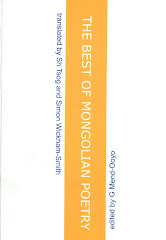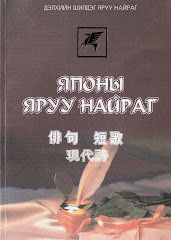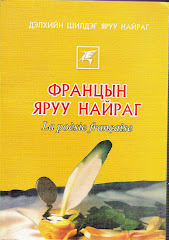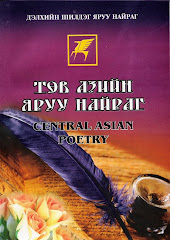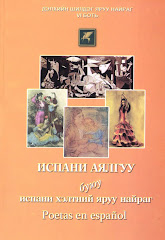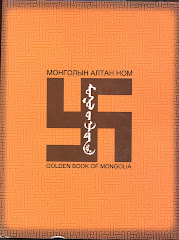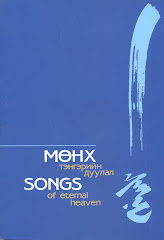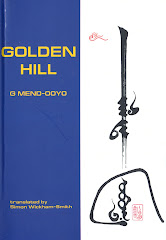Monday, November 17, 2008
T Erdenetsogt
I’ll look away, though
the power of mind
will not bridle my look.
I’ll hide my love, though
the power of mind
will not tether my love.
I’ll protect my words, though
the power of mind
will not rein in my words.
I’ll speak the truth, though
the power of actions
will not whip my mind.
10 x 05
LOVE’S RED ROSE
Let my small sadness send a bird to you.
Let my weak mind make a necklace of wild flowers.
Let my own heart bring tears to my lover’s gaze.
Let me carve strange words in gold and whisper them in your ear.
Love’s red rose,
my bright and royal destiny.
Please protect my desire,
swim in my deep joy.
Let me give to the birds of spring the leaves which fell in autumn.
Let me please with love’s wine the woman who has touched me.
Let me take in my hands the flowers of August for March,
my love, send to me those words I am hoping for.
Love’s red rose,
my bright and royal destiny.
Please proceed, my angel,
into the pure temple of memory.
Though covered by a bright parasol, let me kiss your lips.
Please think that these joys of today will be eternal.
I shall take and caress your delicate hands,
my love, and in days to come let us welcome the sun.
ABOUT WHAT IS
A person it is who goes up to heaven.
A feather it is which sinks into the sea.
A dream it is which covets gold.
A wish it is which takes shelter amid life.
A woman it is who sinks into the flowers.
A picture it is which overnights within the mind.
A word it is which journeys on the wind.
A song it is which emerges from thought.
A person it is who becomes a buddha.
A wish it is which is wealth from grain.
A bird it is which lives upon the land.
A memory it is which withers not, nor grows old.
11 vii 99
SOMEONE ELSE (A BIRTHDAY POEM)
1
Someone else,
someone other than me, is
going in another direction, is
thinking of someone else, is
looking somewhere else, is
planning something else.
Someone else,
someone other than me.
2
I fight with someone else,
I make peace with someone else,
I protect someone else from another,
I tell lies about someone else to others,
I make requests of someone else,
I am distressed, can barely look at someone else,
I feel their pain, I take care of them.
Someone else,
someone other than me.
9 x 00
Ts Bavuudorj
for the Taiwanese poet Yu Hsi
Grass, growing in the east
in yellow waves, and
kneeling and bowing
for so long
to the exalted east.
I place my aching head
upon its warm breast.
It strokes my brow
with its yellowing fingers,
my tears falling thicker and thicker,
covering the silksoft lichen.
An inner suffering
rides upon waves
into the east,
marking my warm body,
and grasshoppers flock
into the silent aeons,
dispersing the light
at the final moment of rest…
And for some time yet to come,
its face unchanging
in golden waves, there will be
grass, growing in the east.
Bankok
BEAUTY, DOZING
To touch the silvern collar
of the beauty, dozing,
was my eternal desire,
and my own silver verses
lit the way like a candle.
My own dear love herself
had fashioned the portentous evening moon,
and, moved by the moment,
I offered a joyful candle,
an ancient prayer, to the Buddha,
while silence filled the spaces
between joyful leaves.
But still more desires
pain the shameless vagrant…
I touch the silvern neck
of the beauty, dozing,
but my eternal desire stays unfulfilled.
I touch her lips…
Friday, October 10, 2008
Gombojavyn MEND-OOYO
Traveling through and time , in company with the sun the moon,
Along the bumpy and winding roads left by old wise men,
Climbing up and down the high mountains and the hills,
Fording hundreds of rivers,
Although I do not know when we may meet ,
I am thinking about the words that I will say to you.
I am coming to you
My roads are open to icy winds and fire.
Although the mist of slander falls on them,
I free my transparent thoughts from any mark ,
Untying all knots with my love .
Lashed by freezing winds ,
I’m keeping onwards in my chosen direction,
I am coming to you
Carrying together autumn’s grief and spring’s renewal,
Grasping the fire of my age and with the sun’s warmth in my hand,
Growing with the growing leaves and withering with them ,
In a garden full of flowers and fruits ,
I pass by a hand offering the glass of enjoyment ,
Driven by my desire,
I am coming to you
All my gentle thoughts of my journey ,
All the sweet moment of my life,
And all my secrets, everywhere,
I bind together in the house of my spirit.
In time without beginning or end,
In space without limit,
I am coming to you
Having only parts of my dreams,
Tasting in my own poetry the very basis of everything that is mine,
Wishing in your heart to tune the strings of inspiration ,
Climbing the chasms of high mountains,
Following impassable paths ,
Seeking the eternal song of the essence of love ,
I am coming to you
Translated by N.Enhkbayar
Paradise and Swallows
A mirage on the blue steppe, like a heavenly city.
My ancestors are forever and only in paradise, and
Only the swallows, hanging above the lonely steppe,
Welcome me into my father’s land.
A thick blue mist is draped over the sky, and
The swallows alone lead the way with flapping wings.
THE CRANES
Excitedly, the black-faced cranes
Come flapping their wings every spring and,
Blue beards fluttering,
Land at will.
It’s not true what they say, that
These wandering birds have no home.
They travel their destiny,
Returning to their birthplace,
Cranes paired together
Over the spacious steppe,
Exhausted from the long flight
Back to their regular haunt.
And, year after year,
The locals become used to these birds.
Near to a farm,
They lay two spotted eggs.
Who could know that
This untrodden place
Hid eggs –
You’d never think it..
When they came to the gentle steppe,
It was to a place without evil.
When they laid their eggs on the bare gravel,
They gave not a thought to misfortune,
They got dirty, protecting
Their unsuckled birds inside the eggs.
An inquisitive fellow, they say,
With not a thought,
Trod local wisdom underfoot.
And subversively pocketed the eggs,
Getting home
Without arousing suspicion.
The two poor cranes
Stepped into pools of rain-water,
Hid their feathers as if they had no wings,
And there spent the summer, without their young.
When the autumn wind ruffled their plumage,
They came near to the farmer who had taken their eggs.
Nobody noticed their grief,
As the horses were trotted out.
Some way away, the farmer’s son, his eyes sparkling -
He had bells on his shoes and a short jacket on -
Ran playfully after the cranes.
The adults weren’t watching him.
The cranes homed in on the happy child,
Running in from behind,
Closer and closer and closer,
Distance out of mind,
And his mother’s breasts ached with pain.
Three times she called her child.
They searched across the wide steppe,
And combed between the blades of grass.
He must have sprouted wings and flown away.
They didn’t find even one of his boots.
As the days are borne forth by the world,
Unravelling us into the kisses of old age,
When will this scrap of a boy be found, he
Who never knew the eggs were stolen?
The cranes’ melancholy song
Is tethered above the ger.
Is it a shadow or a tear?
The milk in the pan has turned.
THE WHEEL OF TIME
The time goes flying, flying by,
The time is gone, is gone.
Quite unexpectedly, the time flies rushing by.
Earth mother swells, the ridges of her brown steppes frail.
Roots of grass suck in the rain, grow saturated.
A flock of birds threads through clouds,
And hills and mountains pass through a vision of horses,
And angry breath is obstinate.
A thread of golden sunlight pierces the flowers on the southern slopes.
Inconstant as time is, the time flies by and is gone.
The moon peeps out from behind a veil of clouds,
And time bashfully steals through the stagnant water.
Youth steps from the army into manhood.
A trotting arrow, cream white steeds, the time goes flying, flying by.
Nighttime lilies caress white beams of light.
A voice's beautiful melody betrays no anger.
A loving couple feasts upon the depths of their life.
The neighbors send out wedding invitations, the time flies by and is gone.
A solitary man in a green haze, sleeping,
Flings stones into the wind.
Why do men's hearts beat in this world?
We're working through this riddle, and the time goes flying, flying by.
They laugh and string their beads.
Their eyes, their skilful golden words, have no time to rest.
They make friends with scholars who traverse the centuries and,
Across the ages still to come, the time flies by and is gone.
The time goes flying, flying by,
The time is gone, is gone.
Quite unexpectedly, the time flies rushing by.
The smell of horses hangs upon a pale blue mist,
And butterflies chase their brawn through flower's honey,
And swans and cranes dance out their native rituals.
Fruit multiplies like stars over the far away mountains.
White horses take a roll and rise up red.
Good fortune spreads, insatiate, through our homeland.
And happiness is infinite, the time flies by and is gone.
Children knock together pebbles to make percussion.
A clash of steel pans, and the seasons fall silent.
We listen to our dear bodies, resonating to a thousand years of song.
The tune of Earthmother's stones, the time goes flying, flying by.
Along the roseate ridges of the still mountains of evening,
The swallows fly up with wings of flame.
Weaving ancient stories to kindle joy and good fortune,
We're thinking like the older generation, the time flies by and is gone.
Ancient heroes gallop through my story.
Old and young smile upon the shining screen.
Face faces face when self meets self,
The Vajradhara is reflected in the present, and the time goes flying, flying by.
The heart beats out the peace of the world, and
We check the hidden nature in the movement of the stars.
Mindful of the map of stations which spans the infinite cosmos,
We hurry towards the future time, the time flies by and is gone.
The time goes flying, flying by,
The time is gone, is gone.
Quite unexpectedly, the time flies rushing by.
While the stars are dozing, the white hoarfrost falls.
The highest price is caught, shimmering at the end of a telescope.
Crops are sown in rows and swell in the sunshine.
Two fledglings flap away the summer on the edge of the dry saltmarsh.
A siege of cranes circles the dried up saltmarsh.
Alongside the returning birds, swirling in the sky,
Raising the misty blue curtain, the time flies by and is gone.
The larks sing, praising the morning's rays.
In waters of desire, floating unprotected from the sun,
We sense the rhythm of original mind.
The heart's reply grows stronger, the time goes flying, flying by.
The birds call gently, summoning their young.
They leave the frozen mandala in swirling flocks.
We sadly take to heart how, in the revolving world,
Our mother's getting old - the time flies by and is gone.
The story of the passing world lies,
Hidden beneath the wings of years; the years leap high,
And a single finger piles the earth over the old as they sleep.
Frost builds up on the tips of grasses, the time goes flying, flying by.
Thick stacks of corpses watch the time go round.
Ancient grasses ripple, untrodden.
We take refuge in unbridled joy, we
Grab onto life, the time flies by and is gone.
The time goes flying, flying by,
The time is gone, is gone.
Quite unexpectedly, the time flies, rushing by.
The sun's eyelids freeze in the endless mandala.
The piercing cold is tamed beneath the best fur hats.
The birds fly off, abandoning the skies.
The sun's rays burnish the silver steppes.
Frozen lanterns, glistening in the camp,
Sway with Orion, hanging in the high heavens,
Earth's satellites flash and fade away, the time flies by and is gone.
The heat from the winter campsite rises up and freezes in the clear sky.
The turning tentpole shows the hand of night.
Around the children, covered by mother's deel, listening to stories
Of "Once upon a time", the time goes flying, flying by.
The horses whinny, echoing their bodies between the hills and mountains.
Sound flows, absorbed into snowflakes, and
The spine of the world relaxes in the four directions.
And, "Happily ever after", the time flies by and is gone.
The moon's rays ask the way of sunlight,
Customs are assumed, then age and wither away.
The world's at peace because of what you've got, and
As you follow your dreams, the time goes flying, flying by.
You take the life you're given and the sands keep running through,
A constant round of joys and destinies and gifts.
Throughout a hundred aeons, bearing witness now
To honest labor and compassion, the time flies by and is gone.
The time goes flying, flying by,
The time is gone, is gone.
Danzangyn Nyamsüren
1
Just one drop of rain is lovely.
The dampness of old grass is lovely.
Spring snow falling on a ger is lovely.
Birds singing here and there is lovely.
The swallows flying overhead are lovely.
The travellers sitting at our hitching-post are lovely.
The women nextdoor are lovely.
To move from pasture to pasture is lovely.
Sudden rainfall on the Khangai is lovely.
The flash of lightning in the dark is lovely.
Teeming rainfall day and night is lovely.
Guests coming from afar are lovely.
Grasses rippling on the yellow steppe are lovely.
Winds riffling at the women’s fringes are lovely.
Sleeping on a haystack on a moonlit night is lovely.
When I’m dreaming, to fall down to earth is lovely.
When the rain takes a breather, it’s lovely.
Water dripping from sopping clothes is lovely.
The sun emerging from a break in the clouds is lovely.
Watching through the door as the larks fly past is lovely.
Horses whinnying at midnight are lovely.
To think of the world awakening in verse is lovely.
Light breaking through the house is lovely.
The morning is lovely.
The meeting and melding of rain is lovely.
The galloping man on the dun-colored horse is lovely.
Saying how we came before the rain is lovely.
Coming in with the bridle and saddle is lovely.
Camels rumbling over the moonlit hills are lovely.
Ai-nan-aa on the strings of the shanz is lovely.
The fire catching light with yellow flames is lovely.
Faces caught in the flickering are lovely.
The call of a crane’s head bottle is lovely.
The rain, falling on salty marshland, is lovely.
A flower’s subtle sign of life is lovely.
The calm before the storm is lovely.
The moon shining through the roofhole is lovely.
Splashing milk in a pot is lovely.
The moon coming out in the depth of night is lovely.
The snorting of a hobbled horse is lovely.
The drizzling of rain is lovely.
The greening of the grassy lawns is lovely.
A southeasterly rainbow is lovely.
The sheen of rainsoaked colors is lovely.
The glint of rainwater is lovely.
Girls washing their pigtails is lovely.
The wafting scent of onion and artemisia is lovely.
To think good thoughts of far and near is lovely.
To come in at dusk is lovely.
To go in the light of dawn is lovely.
To cry soft tears for the motley world is lovely.
To sing joyfully for the broad earth is lovely.
My homeland, like poetry, is lovely.
My country, like song, is lovely.
To experience the turning seasons is lovely.
Rain falling on Ereentsev is lovely!
2
Fallen snow at daybreak is lovely.
Snow falling down the ropes and through the roofhole is lovely.
The mountains and hills shining outside are lovely.
Just one blade of grass blowing in the wind is lovely.
To see a light at home late in the evening is lovely.
The feet of a birthing foal are lovely.
When you spend the night at home, women are lovely.
Stray dogs barking in the moonlight are lovely.
Snow in flurries around the roofhole is lovely.
When it melts in droplets onto the pot’s lid, it’s lovely.
Father sitting in the place of honor is lovely.
Mother coming in through the tentflap is lovely.
The sun striking the low mountain peaks is lovely.
A cart coming this way is lovely.
The wheels on the cart going round and round is lovely.
The birds flying from inside the cart are lovely.
Dull and misty skies are lovely.
Something barely seen in the distance is lovely.
Smoke whirling on the twisting wind is lovely.
Snow falling in heavy bursts is lovely.
To be warmed asleep by the fire in the hearth is lovely.
Dozing off while drunk on a summer evening is lovely.
Who, what..? Any tea? Such woozy words are lovely.
Being led gently by the hand by someone’s elder sister is lovely.
A wide salty plain, striated in greys, is lovely.
A flash upon the distant mountains is lovely.
A dazzling light on liquid snow is lovely.
A day of white and glinting light is lovely.
Closer to the moon, the clearer stars are lovely.
Like my horse upon the steppes of Ongon they are lovely.
Orion, predictor of the future, is lovely.
Like a steed racing through the planets, it is lovely.
The turning of time is lovely.
A country drifted by heavy snows is lovely.
To think that you and me and everyone is cute is lovely.
The ticking of the clock at home is lovely.
To stand outside under a full moon is lovely.
The shapes beneath a cart are lovely.
The pale shadows in depressions are lovely.
To be scared of going over there is lovely.
The whistling of a squall outside is lovely.
Something or XXX moving idly about, is lovely.
Being plunged quite suddenly into darkness is lovely.
Snow packed up at the edge of the ger is lovely.
People coming out of their gers is lovely.
Birds flying in a clear sky is lovely.
To run towards the mountains and the steppe is lovely.
The play of red-cheeked children is lovely.
To come in at dusk is lovely.
To go in the light of dawn is lovely.
To cry soft tears for the motley world is lovely.
To sing joyfully for the broad earth is lovely.
My homeland, like poetry, is lovely.
My country, like song, is lovely.
To experience the turning seasons is lovely.
Rain falling on Ereentsev is lovely!
3
Thawing snow, melting, is lovely.
The time to come is lovely.
Waiting for you is lovely.
To watch the clock is lovely.
The return of birds is lovely.
When they land upon rocks it is lovely.
A person walking along a path is lovely.
When I sit upon a cliff it is lovely.
A woman from nextdoor going for water is lovely.
Watching nearby springs through a telescope is lovely.
The glimmer of a bluegrey mirage is lovely.
The bluegrey deel which fits you well is lovely.
The haziness over the hills is lovely.
The breezing of silken winds is lovely.
The rising of bluegreen mists is lovely.
To sit amidst the swirling fog is lovely.
The flight of sleep on a peaceful night is lovely.
The sounding of a distant noise is lovely.
A vague ringing in the distance is lovely.
A world of lullabies is lovely.
When someone comes along, it is lovely.
If they ask me Do you have a light? it is lovely.
To think you’ll encourage the world and others is lovely.
The loving of all and the flowing of rivers are lovely.
The breaking of ice and the flowing of rivers are lovely.
To think that, falling in, you’d also flow along, is lovely.
Alone on the riverbank, the morning is lovely.
With you on the earth by the river, the evening is lovely.
The magpie chattering away in the courtyard is lovely.
Like fate, when someone comes from the khaan, it is lovely.
When relations come from all around it is lovely.
When close friends come from nearby, it is lovely.
The greyblue outline of our homeland is lovely.
The glint of tears in our eyes is lovely.
To gallop along, standing in the stirrups, and whistling is lovely.
Birds flying over the fourhoof-covered ground are lovely.
To get up early on a spring morning is lovely.
To bridle up a horse and ride is lovely.
The smell of fresh snow is gentle.
To suck the moisture from snow is lovely.
To live in the country year upon year is lovely.
To live like the stars, in a simple dark room is lovely.
To ride upon the revolving cosmos overhead is lovely.
Snow melting down onto still glowing cigarettes is lovely.
The blossoming of plants and flowers is lovely.
The withering of telephone poles is lovely.
The coming of the years is lovely.
The going of the years is lovely.
To come in at dusk is lovely.
To go in the light of dawn is lovely.
To cry soft tears for the motley world is lovely.
To sing joyfully for the broad earth is lovely.
My homeland, like poetry, is lovely.
My country, like song, is lovely.
To experience the turning seasons is lovely.
Rain falling on Ereentsev is lovely!
4
The falling of a single leaf is lovely.
The sun rising over the hills is lovely.
The striiring of a gentle, gentle wind is lovely.
The rising of a still and silent waterspout is lovely.
A glistering fire is lovely.
A single fly sitting on a wave is lovely.
Yellow shit unwinding from a horse is lovely.
The motility of a cart’s crossbeam is lovely.
To think less about near and far is lovely.
A person coming from a town to tell you something is lovely.
Standing watching shapes appear is lovely.
The flapping of a silken towel is lovely.
The movement of white cumulus clouds is lovely.
The mind unwinding within the heart is lovely.
The whispering of drizzling rain is lovely.
A horseman galloping by is lovely.
The thundering of hooves us lovely.
To watch the edges of the sky is lovely.
To trace out cart-tracks is lovely.
Birds flying southwards are lovely.
Their song amongst the clouds is lovely.
The hazy golden of the sun is lovely.
A wild swirl of leaves skirting us by is lovely.
Rain against the yellow sun is lovely.
To pound the strings of the shanz is lovely.
The elegance of noble Khongorzul is lovely.
To think about my idle little brother is lovely.
The nearby clank of silver inlay stirrups is lovely.
A smartly-dressed horseman dismounting is lovely.
The three stages of the aurumn moon are lovely.
The moon coming out over the roofhole on a still evening is lovely.
Listening to stories at a party is lovely.
Chatting about what’s left of an old temple is lovely.
A night of stories, the moon striking the window, is lovely.
Soothing away demons by plaing the flute is lovely.
The moon on a cold evening is lovely.
The stars polished by the wind are lovely.
The balance of sunrise and sunset is lovely.
The similar bedtimes of horses and humans is lovely.
The filigree gleaming on the rocks of earth is lovely.
And writing poetry on them in feathergrass is lovely.
The mind upon the wind which flaps the roof is lovely.
To be too far from a love close by is lovely.
Birds sitting in the leafy world of twigs are lovely.
The Mongolian melodies they sing are lovely.
The blazing sun of the powerful State is lovely.
To ignite the fire of the golden Soyombo is lovely.
To sing when someone comes is lovely.
To weep when someone goes is lovely.
The music of desire in the heart is lovely.
The striking bells of passing time are lovely.
To come in at dusk is lovely.
To go in the light of dawn is lovely.
To cry soft tears for the motley world is lovely.
To sing joyfully for the broad earth is lovely.
Tears are falling from my eyes,
Oh, they well up, they brim over,
For the four seasons in my country.
Ah, my dear ones….
Translated by Simon Wickham-Smith
Lamjav Myagmarsüren
LIKE MOONLIGHT REFLECTED IN JADE
Truth and lies are like moonlight reflected in jade.
I offer to Heaven your loveliness, and
Tie upon it my wish to be with you, to stroke your hair on a pillow.
Beneath your window, I smoke and smoke for the longest time.
My shadow gets tired of me, it weakens into the darkness.
Your laughter is carried through the morning air.
It stimulates me, awakens all my senses.
And, in the beauty of your laughter, even your window
Appears, despite itself, to smile.
My inexhaustible love will cradle you,
Your laughter will enfold and nourish my heart.
I stole your laughter from the wind, it never reached the ground.
I took it into my heart, I sprinkled it on the skin of my mind.
I’ll keep my trust safe, it will soften the morning light and,
As I think of you, I am caressing love.
I’ll carry the molecules of my insignificant body, one by one,
And make up for all the wasted time I can’t get back.
Truth and lies are like moonlight reflected in jade.
I offer to Heaven your loveliness beauty, and
Tie upon it my wish to be with you, to stroke your hair on a pillow.
Beneath your window, I smoke and smoke for the longest time.
My shadow gets tired of me, it weakens into the darkness.
Ochirbatyn .Dahsbalbar
My life is in the white grasses that sway in the wind,
My beautiful Motherland…
I want to purify my mind, give the flesh of my body to your green grasses!
I want to reach happiness, dissolve into the pure, transparent waters of your rivers!
Your eternal sky looks down upon me, oh my Motherland,
And I dry my tears with the grey clouds of the sky.
The Mongolian sun dazzles my eyes with gold,
And smiles like my son Gangabaatar.
I’ll play in the skirts of your sun-yellow mountains, oh my Motherland.
Grant me your life and your merit, oh my sacred mountains…
Sparrows sing in the evening air, send symphonies into my heart.
My mind grows close to Yanjinglhama, resounds with her golden zither.
The dung smoke from the ger draws a curtain in blue across the feet of your distant mountains.
Sheep and goats bleat, cows low, the clear air splashes, and
Truly, the children’s cheerful voices flows the river forth, and
Hardly a breeze sways at the top of the pines.
My meadow-scented mind of wind
Dissolves into the silky air…I know the story!
In ultimate slowness, these berrybrown hills have floated through time.
Faded grasses are sheltering this autumn evening from the bitter wind….
Like my brothers, these hills are used to the world to which they are come,
Like berrybrown birds, they feel the sanctuary of many, many mountains….
The bluegrey smoke of the gers spreads out over the hills.
The bluegrey stars shine in the hollows through the night.
Like grains of sand, the pale earth pours through my fingers.
And time will make my mind pure, like golden sand.
I lie amid the autumn grass and talk with the hills.
Under the silent skies, the nature of the eternally unspoken draws close.
I nod at what is said of bittersweet, of grasping what is too great, and
I feel the nature of the tiniest knolls through the hills upon the wild steppe.
We come to recognise one another, we start through vision to talk, and
Like two lovers, I and the hills become as one….
The hills are feeling the bitter cold this autumn evening, they seek shelter.
I love my mother Nature, who has made these moving hills for me.
The wisdom which completes the incomplete takes form among the hills,
And tears fall into my palm like drops of rain.
This autumn evening, the camels bellow and the withered grass is sad,
And in the sanctuary of the hills I seek refuge from the piercing wind.
My mind feels sad for me upon this living earth.
I hear an orphaned camel calf, bellowing through the years.
This autumn evening, I sit upon the hill like my grandfather, my legs crossed,
And I tell the rosary of my life through the melody of my thoughts.
***
A spring in a saltmarsh,
weeping like a camel’s eye, and
a line of cranes,
tethered like endless days –
they have cradled
my proud support, my motherland,
my own father.
A lake of tears,
aware of the meadow’s children, and
the secret mountains,
obscuring our homeland’s borders –
they have embraced
my heavenly seat, my motherland,
my own mother who bore me.
1996
Dark dark dark dark skies….
Endless endless endless endless time….
Beginningless beginningless, endless space, space….
Deserted deserted, nothing to match the time, the time….
Billowing on the limitless shore of space, of time’s great dark river,
the law, the people and towns, the sun and moon are afloat on this great
river.
But time prevails in this turning world, time is victorious.
The stars are, and they are not, and time connects all, washes all away.
Dark dark, the great river of time billows onwards….
Inconceivable inconceivable space, and here and there the fire of faith
flashes.
We are drowning in the river of vast time,
but do we not, with time, replenish our bodies?
Amid the silence of the not quite empty, not quite empty space,
the world’s sphere revolves, wearing itself away….
A single eye watches a leaf, me, floating on the river of time,
imagines it, unsevered from timelessness….
1979-1982
***
The white night is sleeping like a foal, resting its head on the rocks in the river. Not even the miserable donkey awakens it, nor the jangling iron cart of the water. Was this night sent by the khaan, like his belovèd lady is it resting here?
Not even the Buddha knows the answer. But, after the rain, sleep evades me. I am a young man, so I work at night. It’s like the needle of time. Night is flying, its wings white….
The cliffs gather close to the flow of the river, the night sleeps soundlessly. The lapdogs nearby fear waking it, they gather in their voices. The flow of the river lullabies the night with endless stories. A sudden shift might endanger the night. Far away it flies. I am thinking….Life is tough. The night sleeps, but how come I do not? If I slept, the night would kidnap me. The white night is sleeping like a foal, resting its head on the rocks in the river. Like a woman, this earth is waiting for an answer from Heaven!
1978
I am living by cosmic laws.
By force of will, I was born to the reprobate earth, but I was birthed in truth by a star.
I am contained by the whole earth.
My life on earth is limited.
When the cord was cut, my breathing had rhythm.
Between the start and the finish,
how far I look behind, and stare ahead, is limited.
I live in the breath of the world.
My heart pounds out the beating of the stars,
my veins pulse with the whispering of water,
and the fire’s warmth blazes in my life.
I am living by cosmic laws.
I am granted destiny beneath the moon.
My breathing, thinking, walking on the earth
is limited exactly by the distant stars.
I hold my lover on a cold autumn night,
listening to the grass on the silent wild steppe.
And lips touching softly, and holding hands,
I remain upon the screen of the wide world.
The woman asleep in my lap,
there is no-one else knows this sweet moment.
This, my predestined fondness,
in the logbook of a hundred million years upon the earth.
We have both suffered under cosmic laws.
My body has ridden a multitude to get here.
The wind, storms, the wild steppe, stars by day, autumn knolls -
all that is in the round earth justifies me.
I am living by cosmic laws.
My prayers have made me man, not monkey!
Oh, lying down, I sigh, sigh oh my own powerlessness.
Up into the darkness I stare, and there is reconciliation!
A flame at night calms the whistling of the universe.
A woman holds you through nine months of gentle evenings.
In the boundless cosmos, I turn with the earth’s sphere,
in the myriad assembly of stars, I travel on, honoring the human form!
1983
Danzannyam Shagdarsüren
The weather clears up in your smile,
And the pure moon chooses growth upon the sands.
The mind awakens beneath your gaze,
And our dear ones choose to delay their joy with you.
The stars are happy when you sing,
And silver dust glitters on the earth.
And, when you remember, signs and omens
Bring the shaman’s dreams at night.
The sun shines in your mind,
And iron is tempered in its heat.
I put my trust in you for my desires,
It is for you I sing this little song.
In the distance, glittering with mirages,
Things come together and drift apart.
And, as the dark brown khaliun run,
A gentle flame brushes their stirrups.
In the eyes of one used to the steppe,
The edge of heaven appears nearby.
In the actions of the horses, used to distance,
It seems their homeland stretches straight ahead.
Above, a kite is circling,
Taking the measure of the broad steppe.
And so, tired out below.
I rest upon a hill, I crane my neck back.
Sh Sürenjav
I have come among you as the child of the sky.
I married a girl from the earth,
And drank tea from the cup of the sun.
I got soiled in bitter wine
And tried to find the land of misery.
I sat astride the mountains, I rushed the white snows into flurries,
I played at swinging back and forth between the hills.
As the rains of time poured from heaven, I took pleasure
In climbing the raindrops
Like a rope.
I made a necklace of the stars,
And placed it over a flower’s head.
I have come among you as a child of the sky.
I took the fiery snake from the forked lightning of Khormast,
And exhausted myself by whipping the scapegoat’s back.
I poked a pitchfork at the curly-horned cow,
Rather than at the beady black eyes of ignorance.
I muttered away misfortune and intoned purity into all things.
I crept beneath children and the old and supported the petals of flowers.
I read people’s thoughts from the expression of their eyes,
And I separated truth and lies from the tips of their words.
My senses felt their way through Khurmast’s palace,
And I became known as a poet through the pure waters of my mind.
When I tasted something,
I spat it out disdainfully, I had no expectations.
I have come among you as a child of the sky.
Why my heavenly father is dozing,
Dreaming awhile,
I have came into the world.
As soon as he awakes, I shall go.
Until then, I am with you,
Propping up the clouds, reciting epics,
Sitting with your horsehead fiddles,
Singing songs.
Oh, my country, my people,
When I return, please just give me a horsehead fiddle!
I shall sing your words,
And mollify my heavenly father.
And, pulling down the rain from the palate of the clouds,
I shall always protect you.
I have come among you as a child of the sky.
You, my rocks of marble,
Please remember well
These words of mine.
Damdinsuren Uriankhai
A SPACE SURROUNDED BY FELT WALLS
At a crossroads on the warm earth, they plant
A space surrounded by felt walls.
They’ve made a start, they’re settling in -
Oh, my blessèd, bountiful earth!
Birds fly in lines across the autumn rains,
Fledglings migrating towards the sun.
The foolish flee, they say they will not go,
Their loving families slaughter one another.
Oh these poor ones, what will they do?
Such scant attention to reward and punishment!
My homeland, this is what you are,
The very marrow of our bones!
They think only to sit and fawn
Over the dumb rapids of a stream.
They think only to sit and fear
The river’s brutal snarl.
Below the featherfaced children
Of those poor unlettered birds,
Strange creatures are born to wander,
To peck away at these dear ones.
Riches nomads cannot grasp,
Though poverty they understand.
They stand and make an offering,
Every morning, of the very best of teas.
The threads of the silken earth’s destiny
Are woven within the space enclosed.
They’ve made a start, they’re settling in -
Oh, my blessèd, bountiful earth!
BENEATH THE PROTECTING SUN
Beneath the protecting sun,
Day comes to no harm and night comes to no harm.
I search for many years around the dusty edges.
Friends are kind from childhood and enemies kill each other.
I, beneath the protecting sun,
Stamp upon a insect, my mind full of misery.
My feebleness is tempered by my guilt,
I brandish at myself the sword of hatred.
I, beneath the protecting sun,
Sway and sway like the green grass.
I loom, I loom up like a sheer cliff,
I dessicate the truth upon the elders’ tongues.
I, beneath the protecting sun,
Circle the ger and circle the world.
I repay the kindness of the fortunate,
And, in the place of honor, I gain the world’s respect.
I, beneath the protecting sun,
Write poems like the daytime stars.
My Mongolian poems, with their sunny words,
Recall people and years, like the star of morning.
I, beneath the protecting sun,
Ask from Heaven the blessings of old age.
I ride in winter over many high passes,
Upon a horse that’s not the worse for wear.
I, beneath the protecting sun,
With my Mongol heart absorbed with others,
With my own truth, constant as time passes,
With my life and land, am unexposed to death.
Dolgor NYAMAA
The brown steppe is like an ancient story,
There is no sound to be heard.
A traveller, wearied by the distant road,
Spends the night on the steppe.
In the deep darkness, the objects of the sky
Stretch out white, like a mare’s tethering-line.
He feels the nature of the peaceful steppe,
He watches the stars, as though the horse was missing.
The brown steppe is like an ancient story,
There is no sound to be heard.
Like what we sense among the stars,
The horses neigh at night upon the steppe.
translated by Simon Wickham-Smith
Jamts BADRAA
In the moon’s rays, like the glistening of milk,
The dew glitters with the color of pearl.
Inside, as I stay and wait for you,
My love, I am shimmering white.
As I sit, remembering,
I play and sing.
I have no suffering –
Perhaps I’m lucky.
On the tips of the swaying grasses,
The pearls of dew bear autumn glory.
My breast, as I think and wait for you,
My love, is forgiven and shines.
As I sit, remembering,
I play and sing.
I have no suffering –
Perhaps I’m lucky.
When evening forces its way in,
All is lit by the splendor of the moon.
My heart, patiently waiting for you,
My love, is happy once again.
As I sit, remembering,
I play and sing.
I have no suffering –
Perhaps I’m lucky.
N. NYAMDORJ (1946-1996)
The prettiest woman
Is a great thief of men’s hearts
And a battle field
For many broken hearts
100 hearts strive
For her incomparable self
And, in the end
99 get wounded
Translated and edited by Tsog Shagdarsuren and Simon Wickham-Smith
Begziin Yavuukhulan (1929-1982)
THE SOUND OF SILVER BRIDLE
I’m waiting for my beloved.
Horses’ hooves gallop through my mind,
The night outside is silent and at peace.
And moonlight steals through the roof of the ger.
Sleep flees my orphaned pillow,
I am trapped in my crazy love.
The faint sound of a silver bridle
Startles and pleases my gentle heart
In memory of a friend
We are born into this world
During life’s vacation
And go back
When our vacation ends.
Birth and death
Come in turn like day and night.
And to be alive seems
To be a vacation.
We come to this universe,
We come in crying.
Later, when we go back,
We make others cry.
Translated and edited by Tsog Shagdarsuren and Simon Wickham Smith
R. Choinom (1936-1979)
Oh, your lips, my love,
Were scarlet bows.
Your scarlet bows
You loaded, aimed at me.
Oh, your words, my love,
Were arrows without mercy.
Your merciless arrows
You loaded, aimed at my heart.
And, while you smiled gently,
You pulled back on your scarlet bows as far as they would go.
And, while you spoke your gentle words,
You stabbed at my sad heart.
It’s too late for me to resist.
Take your bullseye as a souvenir.
Translated and edited by Sh. Tsog and Simon Wickham Smith
Mishigiin Tsedendorj (1932-1982)
You and I are sleeping on a cloud
You and I are sailing towards the sun
You and I pass over rivers and streams
You and I pass over gazing horses and animals
You and I pass over vast steppes and noble mountains
You and I pass over a wide road stretching into distance
You and I pass over singing of love songs
You and I are carried on a cloud and sailing towards the sun
You and I are falling to Earth as rain
You and I make flowers with our juices
You and I are vaporizing, rising again into the sky
What’s impossible in this world?
A little rabbit can beat a lion.
A sworn lover,
Bored by his betrothed,
Can switch his loving thoughts elsewhere.
Yes, yes, everything is possible.
What’s impossible in this world?
What’s not happening in this world?
People are living on the moon.
We’re worshipping morons.
My god’s becoming my enemy.
Yes, yes, it’s all happening.
What’s not happening in this world?
What’s not imaginable in this world?
Teachers are being betrayed.
Relatives are being killed.
They want to take the very air we breathe.
Where is the good will to fight this evil?
Yes, yes, they’re thinking all these things.
What’s not imaginable in this world?
But, having nourished my body into this wild world,
I would never hold my mother’s milk for poison.
And, having been lulled to sleep in its arms,
I would never believe the Mongolian language lacking.
I would never betray my language or my mother,
The very soul of my Motherland.
Translated and edited by Tsog Shagdarsuren and Simon Wickham-Smith
Sunvaidanzan, Gunnachug, Injinashi
A PAIR OF SCROLLS
Though, plants and mountains do not grow old
Their heads are whitened by the snow
Though, waters do not suffer
Their face gets wrinkled in the wind
Sunvaidanzan (1834-1898)
AUTUMN SADNESS
In autumn the grass is blue and withered;
In autumn lamps are dim and nights are long;
In autumn looking through the window – the autumn
Injinashi (1837-1892)
The west wind clears the sky
Have those who pretend to knowledge seen it for themselves?
Even a withered leaf flattering in the morning
Is clear to an orphan mediating alone
***
As a lyric of desire
Transforms into a wind of blue clouds
If I can’t stimulate a person’s mind
Why bother plying my easy-going quill?
I’ll stop appealing a higher authority
Instead, I build a ger* of grass out on the western mountain.
Withered flowers will blossom again, but
My grey hairs won’t ever go black again.
Translated and edited by Tsog Shagdarsuren and Simon Wickham Smith
* ger: a nomad’s dwelling made of wood and felt
The melody of the autumn grass and the poetry of the Vanchingbals
Gularansa was born in 1820. Although, he lived only 31 years he much enriched Mongolian literature with his beautiful lyrics. In Gularansa’s works one can see that he was combining the traditions of the Mongolian poetry with the Chinese classical poetry with great skill. He looked through the life in a society with great clarity and wrote “if you want to know the taste of this world taste the gall” and “Writing my mistaken poems with a three inch bamboo is better than running after fame wearing out shoes and socks”.
Like him, his younger brothers Gunnachig, Sunveidanzan and Injinashi started very early composing poems, reading history books and translating literature. The Vanchinbals ran a family teaching in their compound in the western Tumd Hoshuun of Inner Mongolia used to do their literary work together.
The fact that four brother poets were born in the 19 th Century is not a sheer accidental happening.
Dr. G. Mend-Ooyo
Guliransa (1820-1851)
Writing my wrongheaded poems with a three inch bamboo pen
Is better than wearing away shoes and socks in running after fame
But how sad for all of you who haven’t tasted this,
Blunting my enthusiasm with your pointless words
SOMEONE BEAUTIFUL
Your look is like a peach flower of three springs;
Your scent is like grasses of nine autumns;
The black of your hair is blacker than all inks;
Can ever the truest red match the red of your lips?
A PAIR OF SCROLLS ON A STONE MONUMENT
When they say that truth is lie, all lies are true.
When they say that non-existence exists, the existence is non-existent, too.
The script of the blue candle
Worldly affairs are like children’s game
Why do people believe in them?
If you want to know the taste of this world, then taste the gall
If you want to grasp the nature of the many, look closely at the flowers then taste
Winter beauty
Fragments of gammadion on the window of morning
Have painted the faraway mountains in the white silver of the winter’s beauty
In the empty air without edges, ice particles dance
Blurring human traces on the dusty roads of this colored world
Translated and edited by Tsog Shagdarsuren and Simon Wickham Smith
Монголын яруу найргийн тэнгэрт орчихуй - TURNING THROUGH THE SKIES OF MONGOLIAN POETRY
Яруу найраг бол хөгжим, уран зурагтай адилхан шууд сонсоод, эсвэл нүдээр хараад танин мэдэж нууц руу нь нэвтрэн орох боломжгүй урлаг юм. Яруу найраг хэлний үзэгдэл учраас заавал орчуулгаар дамжих ёстой. Яруу найрагчийн онгодоос дамжиж, зохиогдсон эх хэлнийхээ зохист аялгуун чанарт шилжсэн яруу найргийг өөр хэлэнд орчуулах нь бараг боломжгүй зүйл хэмээн үзэх үзэл ч байдаг. Гэвч оюун сэтгэлгээний онцгой үзэгдэл болох яруу найраг руу нь нэвтэрэхгүйгээр хүн төрөлхтөн бие биесийн соёлын үнэт зүйлсийг бүрэн дүүрэн танин мэдэх боломгүй юм. Ийнхүү өнөөдөр улс үндэстэн бүхэн орчуулгын яруу найргийн арвин сан хөмрөгийг цогцлоож, тэрхүү “бараг боломжгүй” хэмээн үзэж байсан бэрхшээлийг нэгэнт туулан хэтийджээ.
Монголчууд яруу найргийн онцгой өвөрмөц сэтгэлгээтэй ард түмэн бөгөөд яруу найргийн үлэмж баялаг өв уламжлалтай ард түмэн юм. Хоёрхон үгтэй хос уянгаас эхлээд 20000 мөртэй хөлгөн туульсийг хүртэл өргөн цар хүрээтэй яруу найргийн өв буй. Харамсалтай нь монголын яруу найраг гадаад хэлэнд маш бага орчуулагдсан. Ялангуяа англи хэлэнд орчуулагдсан нь өдрийн од шиг. Чухам яагаад гэдэг талаар маш их тайлбар ярьж болох боловч оршил үгэнд энэ мэтийг нуршихаас түдгэлзэж Монголын яруу найргийн үлэмж баян сан хөмрөгөөс дээжлэн толилуулж буй шинэ ном руугаа анхаарал хандуулъя.
Хоёр мянга таван оны намар Англиас нэгэн захидал интернэтээр хүлээн авлаа. Саймон Вэккхам Смит нэртэй залуу монголын XIX зууны сод хүмүүн, Данзанравжаагрийн яруу найргийг Англи хэлнээ орчуулж буй тухайгаа бичээд холбоо тогтоохыг хүссэн байв. Монголын яруу найраг руу өрнө зүгээс онцгойлон чиглэсэн анхных ч байж болох тэрхүү хандлага нь их үйл явдлыг эхлүүлсэн юм. Бид байнга захидлаар харилцаж байв. Тэр зарим үгийн тайлбарыг хүссэн байдаг, бид хариулсаар., Нэг мэдэхэд нэг жил өнгөрч нэгэн өдөр Данзанравжаагийн яруу найргийн бүрэн эмхэтгэл 15000 орчим мөр шүлгийн орчуулга ирвэй. Бид түүнийг 2006 оны намар Монгол Улсад болсон Дэлхийн Яруу Найрагчдын XXVI их хуралдаа урьлаа. Их хуралд монголын яруу найргаас барьсан бэлэг гэвэл Данзанравжаагийн “Үлэмжийн чанар” яруу найргийн бүрэн түүвэр, монголын эртний яруу найргийн “Эртний сайхан” эмхэтгэл байлаа. Сүүлийн номыг Монголын авъаяслаг орчуулагч Шагдарсүрэнгийн Цог, Саймон хоёр хамтарч орчуулсан юм. Дэлхийн Яруу найрагчдад бидний барьсан бэлэг энэ. Саймон, Цог бидний зүрх сэтгэл монголын яруу найргийг дэлхий дахинд англи хэлээр дамжуулан гаргах үйлсэд нэгэн хэмээр цохилж, хүний хувьд сайхан анд нөхөд, утга зохиолын ертөнцөд хамтран зүтгэгчид болсон юм. Дэлхийн зам дэнхэл донхолтой. Аян замд сайн нөхөр Ш.Цогийгоо алдаж, “Монголын шилдэг яруу найраг” хэмээх энэ цоморлигийг Саймон бид хоёр Улаанбаатар хотноо хамтран бэлтгэж уншигч олондоо өргөн баривай. Бид энэ номоороо авъаслаг орчуулагч Ш.Цогтоо ном-суварга бүтээж байна.
Номын анд, эрхэм нөхөр Саймон Вэккхам Смит бол монголын утга зохиол, түүний яруу найргийн ертөнц рүү гүнзгий сэлж орсон анхны харийн хүн байх. Тэрбээр монгол хэлийг яаж ингэж гүн гүнзгий сурсны учир начир, арга чаргыг би одоо болтол бодоод олдлггүй. Хааяа л ганц нэг үг асууна. Тэр асуултанд түгдрэх тохиолдол ч надад тохиолдож байсан. Ийм авъаслаг орчуулагч Монголын яруу найрагт зочлон ирснийг би мөнх тэнгэрийн таалал хэмээн бодном.
Энд толилуулан буй монголын шилдэг яруу найргийн цоморлигт монголын эртний улс болох Хүннүгийн дуулалаас XX зууныг дуусталх үеийн монгол яруу найргаас сорчлон дээжиллээ. Найраглал, туульс зэрэг томоохон төрөл зүйлийг энд багтаах боломж байсангүй. Бас зарим нэг яруу найргийн шилмэл бүтээлийг орчуулахад цаг хэрэгтэй байв.
Гэхдээ бидний сонголт нүүдэлчин язгууртай монголын ард түмний оюун сэтгэлгээний ертөнц рүү яруу найргаар дамжин “нүүдэллэх” таны зүрх сэтгэлийн аялалыг гайхамшигтай шинэ зүйлсээр баяжуулан цэнгүүлнэ хэмээн баттай итгэж байна.
Саймон бид хоёр Монголын яруу найргийн сонгодог шүлгүүдийг шилэн сонгоход ихэнхдээ санал нийлж байв. Гэхдээ энд сонгодог яруу найраг монголын шилмэл яруу найргийг бүрэн багтааж яахин барах билээ.
Цаана нь нэмж орчуулах олон гайхамшигтай яруу найраг үлдсэнийг хэлэх хэрэгтэй. Энэ мэт ажил нь олон жилийн уйгагүй хөдөлмөр шаардах үйлс юм. Цаашид дахин нэмж сайжруулсаар байх болнон гэдгээ баяртай өчихийн хамт ямар ч байсан олсон олзоо дэлхий дахинтай бушуухан хуваалцах сэтгэлээр энэ номоо яаран уншигч танд толилуулж байна. Танаас урмын сайн үг сонсох аваас энэ үйлсээ цааш цуцалтгүй үргэлжлүүлэхэд бэлэн байгаагаа өчсү.
Үгийн төгсгөлд хэдэн үг хэлсү. Монгол хэлэнд “ор” “орч” хэмээх язгуур буй. Уг язгуураас “орчлон” хэмээх үг үүссэн юм. “Орчлон” гэдэг нь дэлхий ертөнц, гялатикийг хамардаг. Бас “орчих” хэмээх үг ч буй. “Орчих” хэмээх үгийг монголчууд зөвхөн огторгуй тэнгэр од гараг, оюун санааны бүтээлийн тухайд л хэргэлдэг. Монголын өвгө дээдэс “орчуулах” хэмээх үгийг хэрэглэхдээ “нэг хэлнээс нөгөө хэлэнд буулгах ажил лугаа дүйцэх үйлс хэмээн үзэж байсантай холбоотой хэмээн үздэг юм. Хүн төрөлхтөний соёлын нэг тэнгэрээс нөгөө тэнгэр лүү од эрхэсийг зөөж аваачих мэт хэцүү бэрх үйлсийг амжаалсан эрхэм анд Саймон, Цог нартаа монголын яруу найргийн тэнгэрээс баярын цэцэг илгээе.
Уншигч та Монголын яруу найргийн тэнгэрт түгсэн үй түмэн ододоос өөр өөрийн сэтгэлийн тэнгэрт орчих хөдөлгөөн хийж хүлээн авсугай.
2007.6.6
Г.Мэнд-Ооёо
Human knowledge is stretching ever further. But there are many things which lie beyond our knowledge. This is because, when discussing the creative work of poets throughout human history, the world of the mind transcends nationality. Poetry is even today not open, and the world is as it was before.
Like music and fine art, the secrets of poetry cannot directly be penetrated through the aural or through the visual. Because poetry is speech made visible, in order to make it available, we need to translate it. Even to attempt the translation into another language of a poem, which has been formed in the poet’s individuality and which moves to the melodic and rhythmic qualities of its original language, is almost impossible. But poetry is a special way of looking at the world, and it is impossible for human beings fully to grasp the value of their own cultures. Today, then, we have an abundant store of poetry from all over the world, and so in the future we will achieve which we once saw as being “almost impossible”.
Mongolians are a people with a particular concept of poetry, and a rich and broad poetic heritage, stretching from couplets of two words to epics of 20,000 lines. Regrettably, Mongolian poetry has been translated very little into foreign languages. In particular, translations into English are as rare as a star in daytime. Although I could offer an explanation for this, I will refrain in my introduction from such things, and introduce this new book, in which a sample is presented from the rich heritage of Mongolian poetry.
In the autumn of 2005, an email arrived on my desk from England. A young man named Simon Wickham-Smith had written that he had translated into English the poems of the nineteenth century Mongolian Renaissance man, Danzanravjaa. This first indication from the west of an interest in Mongolian poetry was the beginning of something great. I established a rapport with Simon via email, answering his requests for explanations of specific words. And so, one year ago, around 15000 lines of Danzanravjaa’s poetry was published in English translation. We invited Simon to the 26th World Congress of Poets, which was held in Mongolia during the autumn of 2006. From the annals of Mongolian poetry, we published both the collection of Danzanravjaa’s poetry, Perfect Qualities, as well as a selection of Mongolian poetry called Ancient Splendor. This latter book was a joint translation, by Simon and a Mongolian translator, Tsog Shadgarsüren, and it was presented as a s gift to the delegates at the World Congress. Tsog and Simon had published Mongolian poetry for the entire English speaking world and, in so doing, these two friends had together made inroads into the world of literature. But the road through the world is an uncertain one and, in November 2006, Tsog reached the end of his journey. Simon and I have worked together on this book, The Best of Mongolian Poetry, in Ulaanbaatar and, in offering it to our readers, would like to dedicate it as a memorial to the translator Tsog Shagdarsüren.
My good friend Simon Wickham-Smith is one of the first foreigners to have swum so deeply into the world of Mongolian literature and its poetry. Thinking now about how he managed so deeply to study the Mongolian language, I find it both rare and precious. Sometimes, he asks only about a single word. His questions even give me pause for thought. For such a gifted translator to have come to Mongolian poets, I believe, fills Heaven with joy.
For this collection of the best Mongolian poems we have sourced texts from far back as from the ancient songs of Khünnü, as well as from the poems of contemporary Mongolian poets. It has not been possible to include here examples of the highly significant epic poetry, and it will require further time to translate more of the very best work of certain poets.
That said, the traversing by poets of the nomadic mind of the Mongolian people, which constitutes the wonderful work in this new book, will entertain and profoundly enrich the journey of your own mind.
Simon and I have worked together in selecting these poems - although how could a selection be expected to include the full extent of Mongolian poetry? Nonetheless, there are some wonderful poets whose work has been translated here. Work of this caliber requires many years of tireless labor. I should also add that the original text of Ancient Splendor has herein been revised and improved and that the insight we have gained has been quickly incorporated. With this in mind, we have made our book easier for the impatient reader and we guarantee that, trusting in the readers’ good will, our work will continue.
A final word about etymology. In the Mongolian language there is a root, orch. From this word is derived the word orchlong. Orchlong denotes the world, or galaxy. And then there is the word orchikh. For Mongolians, orchikh is concerned with the turning of the mind, and of the sky and the stars and the planets. The Mongolian elders explain the word orchuulakh as being the work of turning one language into another, and of the rotation of the stars and the planets. To understand how these words relate to one another is to understand the earth. To Simon and Tsog, who managed to complete this difficult work, as though translating the heavenly bodies from one sky of human culture into another sky, let us send the rich flowers from the sky of Mongolian poetry.
I hope that you will agree that, from the many stars appearing in the sky of Mongolian poetry, we are led further into the sky of our own minds, and into the minds of others.
Ulaanbaatar
June 6th 2007
Thursday, October 9, 2008
B. Rinchin (1905-1977)
The mottled yellow moon, the old crone,
Slipped on her deel of perforated clouds and,
Leaning on her walking-stick of white rays,
Drove out her flock of her calves, the stars.
Her little cousin, meanwhile, the wind, whistled his way
Through her ragged deel of clouds.
In the Wilds in Autumn
Tiring the eyes, the wild steppe ripples,
Yellowish and soundless.
Grasshoppers, the world’s voice, keep silent.
In the sky above only the storks are calling.
From the withered, yellow sphere of the sky
Comes a lovely and intriguing scent.
From the foreheads of the stone men in the cemeteries,
The hoarfrost melts into pearls of sweat.
Translated and edited by Tsog Shagdarsuren and Simon Wickham- Smith
D. Natsagdorj (1906-1937)
Spring
A thousand thousand springs beneath the eternal sky
In lovely Mongolia, a breadth of years and years.
In this gentle season, the people’s minds are calm,
And livestock serene in the verdancy of grass.
Patterns of snow thaw as the distant sun draws near.
The old is made new in the world.
Trees blossom, children play outside, and
Old men think themselves young.
The braying, honking geese fly back to the steppe.
The herders, sitting at home, are moved by their call.
Rivulets stream down the mountainsides,
And goats and kids bleat out their joyful song.
You can feel a peaceful blessing,
Awakening the hidden mind, conjuring the past and present.
Wonderful new life ornaments the folds,
And parents delight in their cradled child.
Summer
When gorgeous summer starts,
On the gorgeous Khangai ranges,
The cuckoos sing out sweetly –
Oh, how lovely this world is!
A green haze hangs in space, a delusion of mirages,
And a horse neighs, longing for its home.
A rain of flowers purifies the face of the world,
And young people cram their minds with one another.
In summer, the mountains teem with fresh waters.
Mongolia takes pleasure in her three manly sports, and
Children sing their horserace song throughout the valleys.
These swift and gleaming horses are admired by all.
Festive melodies echo across the vast steppe.
Livestock graze the countryside, and
The scent of airag fills everyone’s nostrils.
Everywhere is so lovely, such happiness everywhere!
Autumn
The yellow sun of autumn shines on you and me,
And we are moved by the changing seasons.
Stags and moose bellow and pleasure the mountain streams,
And lowing cows drive on the herdsmen.
Thin clouds scud across the lovely skies, and
Young people go abroad to study.
The voiceless limpid river flows,
The moon’s reflection whispers tales of love.
In the morning hoarfrost, glistening like pearls,
A horse, tethered outside, shifts and shivers.
While he’s out early hunting fox and wolf,
His wife and kids wait at home, distilling arkhi.
The gentle winds of autumn move the trees and grasses.
The hearts of old and young are filled with tears.
Leaves drift down from the yellowing trees,
And sometimes we have sadness in our hearts.
Winter
Icy breath snaps the air.
Mountains and valleys in the golden world are mantled in silver,
And the stars in the wintry skies glimmer like sparks.
The caravanners’ song echoes across the broad steppe.
The high peaks are held by mist and fog.
Our eyes grow wide in the hollows of the vast steppe.
The cattle in the fresh pastures glow with health,
Corralled by whistling herdsman.
The cold freezes you to the marrow on the high ground.
There’s a fire in the faces of young Mongolians.
The Pleiades hang over the mountains, the candlelight grows dim,
And the old folk stoke the fire and spin their words.
Winter, spring, summer and autumn are the turning seasons.
Mountains, water, sun and moon are firm friends.
A farewell to the old, a welcome to the newborn –
Unceasing for a thousand thousand years.
Translated by Simon Wickham Smith
Dulduit Danzanravjaa (1803-1856)
Your perfect qualities,
Are like colors reflected in a mirror.
I see your shining face, my dear,
And truly you have captured
My entire mind and body.
Like the cuckoo’s song,
You relieve the stress in my mind.
Your kind words are gentle, my dear,
With such kindness you sit
And offer comfort.
Your elegant body ,
Borne upon the breeze,
Is beyond words, my dear.
Like the scent of red sandalwood,
You more and more entrance my thoughts.
Like the taste of honey
Flowing from the heart of the lotus,
Joy in you, my dear,
Makes me ever happier,
Happier beyond belief.
In this human age,
To do what you wish
Is to wish for the things of heaven.
Afloat upon the ocean of deep enjoyment,
Let us be joyful together.
And oh, the old get older without collecting merit - what a shame!
And oh, the young get dressed up without straightening their minds - what a shame!
And oh, the wise don’t put their Dharma minds together - what a shame!
And oh, the princes are showy when they serve - what a shame!
And oh, the girls support their men, but not their father - what a shame!
And oh, the ministers quarrel together over the state - what a shame!
And oh, the pandits learn various things, but not the Dharma - what a shame!
And oh, the yogis scream phat! when they’re meditating - what a shame!
And oh, the sangha study in the monastery by day and wander round the camp at night
- what a shame!
And oh, the students pray openly and stuff themselves in secret - what a shame!
And oh, the doctors consider cost and not a helpful attitude - what a shame!
And oh, the cautious expose the faults of others, and don’t look at their own faults -
what a shame!
And oh, the girls’ eyes watch his face, but their minds are on the way his ass moves -
what a shame!
And oh, the scholars teach others by day and slack off at night - what a shame!
And oh, the men come visiting, lambasting their wives - what a shame!
And oh, their wives make friends with others, without addressing what their husbands
say - what a shame!
And oh, if I have these faults myself, then I am first amongst equals - what a shame!
And oh, which of the others, old or young, does not? What a shame! What a shame!
Please don’t stop. Oh, you poor things!
With gentle, gentle steps
My creamwhite horse with black eyes
Stays well away from
The mass of geldings.
That one, my bright one,
Just standing amidst the crowd,
Just standing there, alert,
Its temperament so lovely.
The nightingale on the glacial lake
Sings in vain its strange songs.
Why did the child of the man
Love in vain and too much?
What is this thing called love?
It’s a lovely, ancient benediction.
Let us take the short cut by the southern slope
And reach the distant land.
It’s a pleasure to go meet
The one you desire -
You’ll need the riches of Dharma.
Let's enter Abhidharma and enjoy eternity.
Namo guru Padmasambhavaya!
Despite my laziness,
This is what I’ve written today
In my drunkenness -
My song, made up of various things.
For sure, if you think to understand your mind,
They say Mahakala’s kindness is not far, it’s really quite close.
Once the struggle’s over,
A light arises, shining from within.
Oh, my poor one!
You find this human body, in a single lifetime -
You use it pointlessly.
Thinking of Mahakala, whose blessing is profound,
You walk through the world of creatures on an even keel.
Zee ayakhai!
You have no need of pleasure, my holy lama Mahakala.
And, if we place a true prayer at the center of our heart,
Please grant pleasure, with equanimity,
To the creatures of the Gobi - and specially to me.
All these things I offer in sacrifice.
Zee zui zee kho zee.
May you look with love upon the kindness of all beings.
When in my life may I trust you from the center of my heart?
The protection of all beings is in your power,
May it seep out through the narrow defiles of the world.
Zee zui zee khoo zee.
I think of my kind mother, even though I’m old;
Compassionate like my father, I make firm friends.
Tired of the dangers of the hidden world,
When in my life shall I think of my protecting lama?
Zee zui zee khoo zee.
The isolated mind is hard like a demon.
Our life in the world is like a night-time dream.
When I speak with care about the Triple Jewel,
May my mind grasp the oath with purity.
Zee zui zee khoo zee.
What is this disreputable drunk
Saying to you as he makes his escape?
I speak with pure commitment,
Please listen closely to these various things.
Zee zui zee khoo zee.
I go back to my ger and my cattle,
But I’m in two minds.
The way through the slanderous world doesn’t matter, does it?
We’ll meet in the mandala, where everyone is camped.
Zee zui zee khoo zee.
You won’t find anyone who’ll not end up dead.
In this life, as we move away from what’s disruptive,
May we find the path of the liberated Aryas.
My glorious lama, please give your advice.
Zee zui zee khoo zee.
Oh, oh, this is all a game.
The gifts are good and good fortune is tranquil.
Complete happiness, a wonderful experience!
DUALITY
Wisdom and ignorance is duality, and
Hitting the mark and getting it wrong is duality.
Disturbed and attentive is duality, and
Goodness and badness is duality.
Virtue and sin is duality, and
Help and hindrance is duality.
White and black is duality, and
Receiving and rejecting is duality.
Samsara and Nirvana is duality, and
Bad and good is duality.
The state and the clergy is duality, and
This life and the next is duality.
Heaven and earth is duality, and
Tall and short is duality.
Self and other is duality, and
Inside and outside is duality.
Winter and summer is duality, and
Cold and heat is duality.
Sun and moon is duality, and
Fire and water is duality.
Birth and death is duality, and
Combining and breaking is duality.
It is and it is not is duality, and
Easy and difficult is duality.
Father and mother is duality, and
Wisdom and skilful means is duality.
Buddhas and demons is duality, and
Superior and inferior is duality.
Happiness and suffering is duality, and
Desires and frustrations is duality.
Body and mind is duality, and
Healthy and sickly is duality.
Before and after is duality, and
What has come and what is coming is duality.
Firm and fragile is duality, and
Slow and fast is duality.
Circular and triangular is duality, and
Defective and faultless is duality.
To come together and to depart is duality, and
To be seen and to disappear is duality.
Happiness and fear is duality, and
Explicit and hidden is duality.
Faith and doubt is duality, and
Trust and support is duality.
Wisdom and error is duality, and
What is and what is not is duality.
Alchemy and dream is duality, and
Created and uncreated is duality.
Word and fact is duality, and
Sign and thought is duality.
Drunk on the one taste of pairness
In the sky of nonduality,
My friends, may we accomplish
Our prayer of disappearance.
Gobi Noyon Khutugtu Danzanravjaa was a religious philosopher, educator, talented painter, composer, drama writer and poet. He wrote more than 1500 works both in Tibetan and Mongolian.
Translated by Simon Wickham Smith
G. Zanabazar (1635-1723)
G. Zanabazar (1635-1723)
To the root and lineage lamas who bestow the highest blessings,
To the yidam and the peaceful and wrathful gods, who fall in a rain of siddhi,
And to the dakini and Dharma protectors who eliminate all obstacles,
I prostrate with great respect of body, speech and mind.
I make an offering of concrete things and those created in the mind,
Spreading out through space, as far as it endures.
I admit my faults and errors, built up throughout eternity, and
I rejoice at goodness done by Holy Ones.
I pray you turn the wheel of profound Dharma,
To remain firm until samsara ends.
I pray that, in this ocean of suffering, all the virtue be increased,
Of the Buddhas and their descendents in the three times.
To purify our darkness and our ignorance, and
To spread the light of wise omniscience,
Protect us in these sinful times with your compassion,
We who have met with great wickedness and ignorance.
By pacifying the great fire of suffering,
In which the seeds of evil ripen,
May our minds be loving and, without anger for each other,
May our happiness spread.
Save us, save us, undeceiving Lord!
Watch us, watch us, you boundless source of love!
Do not forget, do not forget, you ancient Dharmapalas!
Think of us, think of us, and quickly save us.
May the sunlight of the Buddha’s teachings spread throughout the ten directions,
May the glorious happiness of all last eternally, and
May we quickly reach that omniscient state,
Where all defilements are purified.
Through the blessing of the lama and the triple jewel and
The undeceiving power of the changeless Dharmadhatu,
Through the activity of the Dharmapalas
May we attain the endless height of Sumeru.
Through the blessing of the lama protectors,
May all present and transcendent troubles be pacified.
May we enjoy the self-arising, universal glory
Of samsara and nirvana.
Sarva mangalam
The First Bogdo Zanabazar, son of Tusheet Khan Gombojavof the Chinggis lineag, was the head of Mongolian Buddism, a uiniquely talented sculptor, educator. His Janlav Tsogzol is a unique and magic poem.
Translated by Simon Wickham-Smith





